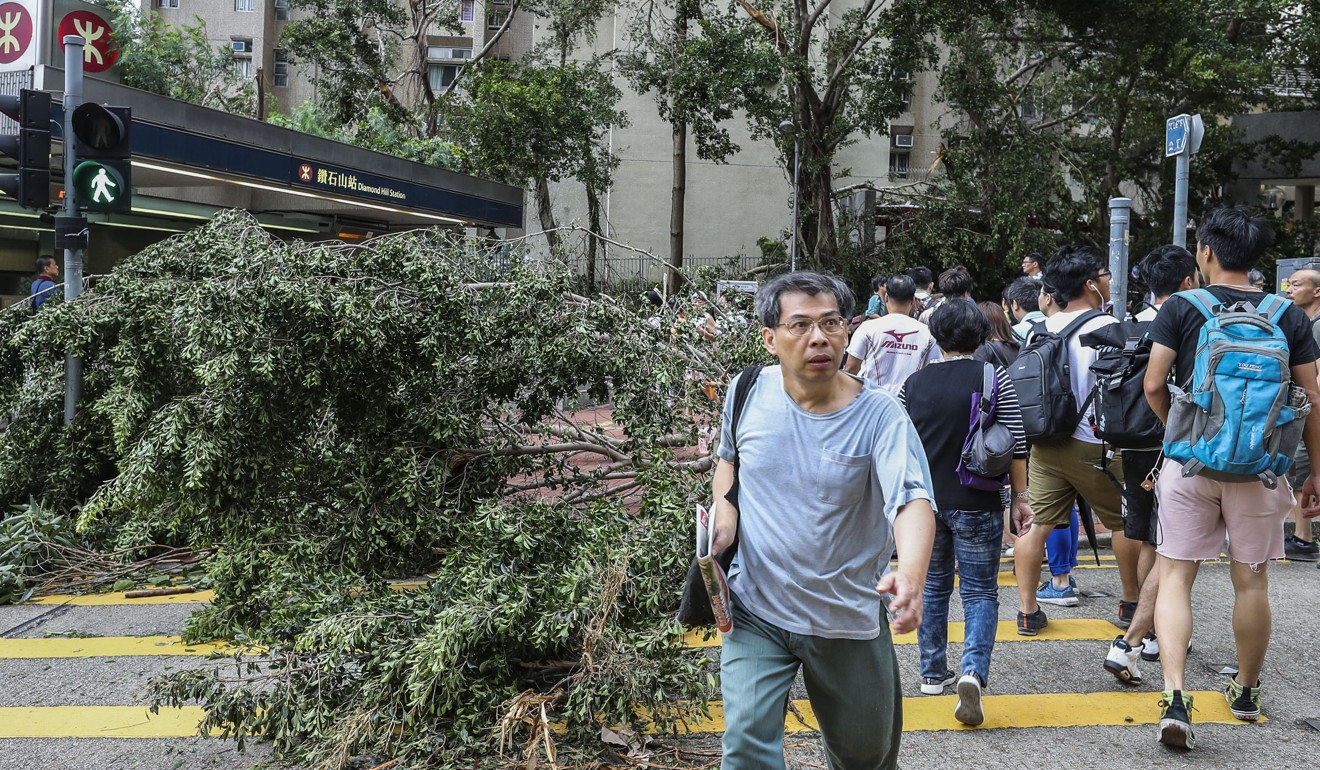
State of emergency law following extreme weather events such as Typhoon Mangkhut not needed, say Hong Kong officials
- Deputy security minister Sonny Au tells Legco meeting government’s mechanism to prepare for and respond to super typhoons has been effective
- Lawmakers across political spectrum say such guidelines do not go far enough to protect employees from being forced to work
A law allowing Hong Kong’s leader to give workers a day off after extreme weather or natural disasters is not needed, officials said on Tuesday, despite calls for the government to better protect labour rights.
Deputy security minister Sonny Au Chi-kwong told a security panel meeting at the Legislative Council there was no need for such a law at present.
“The government’s mechanism [to prepare for and respond to] super typhoons has been effective, although there is room for improvement on work arrangements under extreme conditions. But there is no need for legislation,” Au said.
Officials last week proposed a two-hour grace period for about 3.8 million workers after a storm subsides instead of requiring them to return to work immediately, as part of a post-recovery review after Typhoon Mangkhut battered the city last September.

The new measures would apply only under extreme conditions, such as large-scale power outages, extensive flooding, major landslides and paralysed public transport services.
It would be included in guidelines from the Labour Department but not legally binding.
Lawmakers across the political spectrum said such guidelines did not go far enough and insisted a legal framework was needed.
They said employees would be forced to work after a storm or face punishments such as docked pay or leave.
It’s not easy to draft a law suitable for all industries that would not affect the recovery
Civic Party lawmaker Alvin Yeung Ngok-kiu tabled a State of Disaster Bill, which would allow the chief executive to declare a state of disaster and lay out employment protection. The pro-establishment Federation of Trade Unions (FTU) said they would table a similar bill in June.
According to Yeung’s bill, any worker would be entitled to be absent from work when a state of disaster was declared. Employers who penalised staff for being absent would face legal sanctions.
Employers would also be liable if workers had an accident going to work or while working during a state of disaster.
The Labour Department’s assistant commissioner Melody Luk Wai-ling said there was no one-size-fits-all solution.
“It’s not easy to draft a law suitable for all industries that would not affect the recovery,” Luk said.
“We can’t draw a line to say which types of industries need not go to work under those situations … Instead we should allow employers to make arrangements according to their industry’s needs.”

Typhoon Mangkhut prompted the city’s weather authority to issue its highest typhoon warning, the No 10 signal, for 10 hours on Sunday, September 16 last year. The city was paralysed after the storm subsided, with many public transport services left inoperable, and roads blocked by fallen trees and debris.
Commuters struggling to reach work the next day were left fuming and Chief Executive Carrie Lam Cheng Yuet-ngor came under fire for refusing to declare a holiday under the Emergency Regulations Ordinance.
During Tuesday’s meeting, FTU lawmaker Kwok Wai-keung urged the government to consider asking the People’s Liberation Army stationed in Hong Kong to help with the clean-up efforts.
Au said there were up to 17,000 emergency responders that had helped in the aftermath of Mangkhut and he was confident they would handle another such storm.

Under the Garrison Law, the PLA must not interfere in local affairs, but troops can be called out to help with disaster relief if requested by the Hong Kong government. The central government would have to approve the request and the troops would have to return to barracks immediately upon completion of the tasks.
Last year, more than 400 soldiers from the Hong Kong garrison helped remove felled trees along the MacLehose Trail as part of a voluntary community service organised by Beijing’s liaison office and a group of local Chinese businesses.
The government had not made any request and it was the first time the troops took such an action since the city returned to Chinese rule in 1997.

